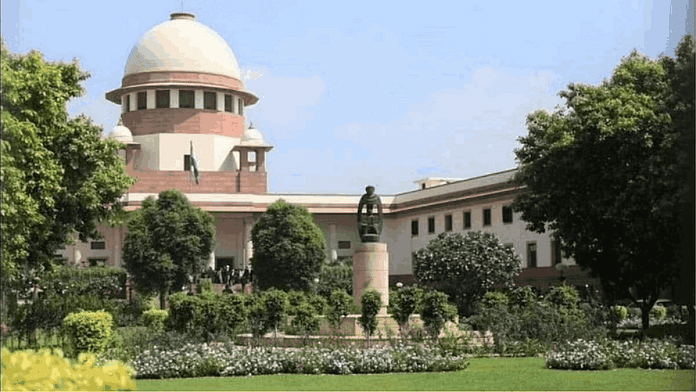New Delhi: Deciding on a woman’s plea to terminate her pregnancy, a three-judge bench of the Supreme Court Friday demanded a report from All India Institute of Medical Sciences (AIIMS), New Delhi, on the health of the foetus as well as the physical and mental condition of the petitioner who is over 26 weeks pregnant.
Headed by Chief Justice of India D.Y. Chandrachud, the bench was hearing the plea by the 27-year-old married woman who claimed “she is neither physically, mentally, psychologically or financially prepared to continue with the unwanted pregnancy”, according to the apex court order.
While her petition was allowed on 9 October, a two-judge bench delivered a split verdict on 11 October after the central government filed an application demanding recall of the order, and that the court should “consider protecting the right to life of the unborn child so that the child has a fair chance of survival”.
This was after Additional Solicitor General (ASG) Aishwarya Bhati received an email from an AIIMS doctor clarifying that “the baby is currently viable (will show signs of life and have a strong possibility of survival), and therefore termination can only be done if it is preceded by a foeticide (stopping of the foetal heart)”. The three-judge bench then took up the case on 12 October, Thursday, when the court asked ASG Bhati as well as the petitioner’s lawyer to talk to the petitioner woman and come back to the court Friday.
During the Friday hearing, Bhati informed the court that they were not able to convince her to carry out her pregnancy full term. She also emphasised on the fact that the Medical Termination of Pregnancy Act, 1971, is a “pro-choice legislation”, but the rights of the unborn child also have to be balanced.
The petitioner’s lawyer told the SC about her medical history. He submitted that after her second delivery, she has been suffering from postpartum psychosis and has been undergoing treatment for it.
“If the petitioner doesn’t take medicine for even a single day, she has a problem. She can’t sleep. She gets hallucinations. She has attempted to commit suicide. She even tried to harm her child. That’s why the children are with the mother-in-law,” the lawyer was quoted as saying by LiveLaw.
Her prescriptions were also submitted in the court. However, the court noted that the prescriptions were silent on the nature of the ailment and raised doubts over their legitimacy.
The court then felt it would need the medical opinion of AIIMS on whether the foetus is suffering from any “substantial abnormality”. “Let AIIMS carry (out) a study on the effect of medicines on the foetus and the condition of the foetus now,” the CJI said.
The court demanded to know whether there is any evidence to suggest that the drugs prescribed to the woman would jeopardise the continuance of her pregnancy full term. AIIMS, it said, is at liberty to carry out their own independent evaluation of mental and physical condition of petitioner.
If she is found to have postpartum psychosis, the court said AIIMS can find whether any alternate medication is available to protect the foetus. The court, therefore, asked her to appear before the AIIMS board at 2 pm, Friday. The matter will be taken up again on Monday.
Also read: ‘Journalism can’t be prosecuted as terrorism’ — media groups write to CJI on NewsClick raids
The split verdict
On 9 October, a SC bench comprising Justices Hima Kohli and B.V. Nagarathna had permitted the woman to terminate her pregnancy. However, the next day, the central government filed an application demanding recall of the court’s order.
The application was filed on the basis of an email dated 10 October sent by one of the members of the medical board that was earlier constituted on the Supreme Court’s direction. The email, produced in the top court’s 11 October judgment, said “as the baby is currently viable (will show signs of life and have a strong possibility of survival)”, the doctors would need a directive from the Supreme Court “on whether a foeticide (stopping the foetal heart) can be done before termination.”
The same day, deciding on this recall application, a difference in opinion arose between Justice Kohli and Justice Nagarathna wherein the former said that her “judicial conscience” does not permit her to permit termination of the pregnancy.
However, Justice Nagarathna did not agree, and asserted that “it would be incongruous to conclude that the foetus has a separate identity from the mother and in spite of the physical or mental health of a mother being under threat, she will have to continue her pregnancy until the foetus is born which would endanger her delicate health.”
If you are feeling suicidal or depressed, please call a helpline number in your state.
(Edited by Smriti Sinha)



